“I Love You” in Italian
When it comes to expressing amore (love) in Italian, there are different phrases you can use. We have a variety of ways to say “I love you” in Italian depending on the context, relationship, and intensity of feeling.
Italian culture is steeped in romance, and its language reflects this beautifully, offering expressions that range from the deeply romantic to the lighthearted and friendly.
In this article, I will guide you through different expressions you might find useful to say you love someone, across different relationships and situations, from passionate declarations to affectionate sentiments for friends and family.
How to say “I Love You” in Italian
How to say “I Love You” Romantically
When speaking of romantic love, Italians use some of the most powerful and expressive phrases to convey their feelings. Here I will list some of the most popular ways to say “I love you” in romantic settings:
- Ti amo: this is the most well-known phrase, reserved for deep, passionate love. It’s typically used between romantic partners, such as spouses or serious partners, and appears frequently in Italian poetry and literature.
Ti amo con tutto il mio cuore.
I love you with all my heart.
Notice that Italians don’t use ti amo lightly; it’s reserved for someone truly special and significant.
- Sono innamorato/a di te (I am in love with you): this phrase captures the feeling of falling in love and works well when feelings are new and exciting.
Non posso nasconderlo più, sono innamorato di te.
I can’t hide it anymore, I’m in love with you.
- Sei la mia anima gemella (you’re my soulmate): if you feel like someone is “the one”, you can use this phrase to express a bond that feels destined or fated.
Lo sento profondamente, sei la mia anima gemella.
I feel it deeply, you’re my soulmate.
- Sei il mio tutto (you’re my everything): for someone who is essential to your life, this expression carries a powerful meaning and is commonly used in long-term relationships.
Non dimenticarlo mai, sei il mio tutto.
Never forget, you’re my everything.
How to say “I Love You” non-Romantically
When Italians want to express love to family or friends, they use different phrases that capture affection without the romantic undertones:
- Ti voglio bene: this phrase translates roughly to “I care about you” or “I love you in a caring way” and is commonly used with family members, close friends, and even long-term partners.
Mamma, ti voglio bene.
Mom, I love you / I care deeply for you.
Italians use this phrase often, as it conveys warmth and closeness without the intensity of romantic love.
- Ti adoro (I adore you): a lighter way to express fondness, this expression can be used with friends, family, and partners. It’s affectionate and can be used with romantic partners without the same weight as ti amo.
Sei fantastico/a, ti adoro!
You’re amazing, I adore you!
- Ci tengo a te (I care about you): this is structurally more complex, as it makes use of different pronouns. It is used to convey admiration and affection, making it versatile for both romantic and platonic relationships.
Sei un grande amico, ci tengo molto a te.
You’re a great friend, I deeply care about you.
How to Respond
If someone declares their love for you in Italian, you might want to be able to say “I love you too” in Italian. Here I will show you some ways to respond based on your own feelings:
- Anch’io ti amo (I love you too): use this in response to ti amo if you feel the same way.
- Anch’io ti voglio bene (I care deeply for you too): a fitting response if someone says ti voglio bene and you share similar feelings.
- Anche io mi sento così (I feel the same way): a neutral expression to use if the person expresses their feelings.
With these phrases, you’re ready to respond to any heartfelt Italian declarations, whether reciprocating love, expressing admiration, or simply acknowledging affection.






